Book a Telehealth Appointment (NY, NJ, FL)
Petros Efthimiou, MD, FACR (Founder, Managing Partner)
&
Dr. Efthimiou’s Academic Affiliation: Albert Einstein College of Medicine, NY, NY
https://einsteinmed.edu/faculty/17676/petros-efthimiou
Please do not hesitate to contact us with your contact information if you require assistance making an appointment.
The ACR salutes Petros Efthimiou, MD, with @RheumatologyNew for encouraging & inspiring medical students & residents to pursue a career in #rheum → https://t.co/wDSXZe1toS #RheumChangeMaker pic.twitter.com/9H8TExQ0LB
— American College of Rheumatology (@ACRheum) July 6, 2021

Petros Efthimiou is a Board Certified Physician in both Internal Medicine and Rheumatology at the rank of Clinical Professor of Medicine & Rheumatology.
A summa cum laude graduate of the University of Ioannina Medical School in Greece, Dr. Efthimiou became a Research Scholar at Northwestern University College of Medicine in Chicago, Illinois. He then completed his Internal Medicine Residency at Brown University in Providence, Rhode Island, while his Rheumatology Fellowship took place at the Hospital for Special Surgery and New York Presbyterian/Cornell Campus.
Dr. Efthimiou has expertise in the treatment of autoimmune disorders including Rheumatoid Arthritis, Psoriatic arthritis, gout, osteoarthritis, myositis, SLE-lupus, Sjogren’s syndrome, Vasculitis, Pulmonary Hypertension, Scleroderma, Osteoporosis, Auto-inflammatory Syndromes and Adult Still’s Disease. Dr. Efthimiou has published extensively in peer-reviewed journals and medical textbooks and has served as Clinical Investigator in multiple, international, randomized controlled trials. He has served as an ad hoc reviewer and editorial board member in peer-reviewed rheumatology journals and is a frequently invited speaker in national and international medical conferences.
A 2011-25 “Castle Connolly” and “US News & World Report”, Top Doctor in Rheumatology, he was the recipient of the Patients’ Choice Award in 2012-25 and named a 2014-25 “Super Doctor” by the New York Times and “Best Doctor” by New York Magazine. He has published a medical textbook in the Auto-inflammatory Syndromes and a Rheumatology Review Textbook.
Dr Efthimiou is Board Certified in both Rheumatology and Internal Medicine and Licensed to Practice Medicine in NY, NJ, and FL.
Membership:
The American College of Rheumatology (ACR)
THE INDEPENDENT DOCTORS OF NEW YORK (IDNY)
Medical Society of the State of NY (MSSNY)
New York County Medical Society (NYCMS)
Group for Research and Assessment of Psoriasis and Psoriatic Arthritis (GRAPPA)
Hellenic Medical Society of New York (HMSNY)
International Myositis Assessment & Clinical Studies Group (IMACS)
Absolute Rheumatology Review made it to the Best Rheumatology Books of All Time
I am happy to announce that my book, “Absolute Rheumatology Review”, made it to BookAuthority’s Best Rheumatology Books of All Time:
BookAuthority collects and ranks the best books in the world, and it is a great honor to get this kind of recognition. Thank you for all your support!
a rheumatologist at NewYork-Presbyterian Brooklyn Methodist Hospital reveals the fascinating pathways to diagnosing and treating autoimmune disorders
By megan schade • photos by amessé photography
“Why, sometimes I’ve believed as many as six impossible things before breakfast.”
—The Queen, in Lewis Carroll’s Through the Looking-Glass and What Alice Found There
The Queen’s sentiment is one that is surely shared by many a rheumatologist. Rheumatology is a subset of internal medicine that diagnoses and treats systemic autoimmune disease and inflammatory conditions that affect the joints and connective tissue. The specialty can be nebulous and often overlaps other fields of study, including immunology, orthopedics, pulmonology, dermatology, and surgery.

The body’s immune system produces cells that fight infection and disease. When something in the immune system goes awry, these disease-fighting cells start attacking healthy cells. No one knows exactly what triggers the immune system to backfire, but genetic predisposition and environmental factors are known to play a part.
“Autoimmune diseases often mimic symptoms of other conditions, and the symptoms may appear in parts of the body that make no sense from a systemic point of view,” said Petros Efthimiou, M.D., A.Chief of Rheumatology at NewYork-Presbyterian Brooklyn Methodist Hospital. For instance, a patient with psoriasis might visit a dermatologist to receive treatment for her inflamed and red, patchy skin, never realizing that the increased joint pain in her fingers is part of the same disease: psoriatic arthritis. Or a woman may wake, confused by the combination of stiffness in her knees and a butterfly-patterned rash across her cheeks, not knowing the tell-tale signs of lupus, in which the immune system attacks healthy tissue in different parts of the body, causing painful inflammation.
Women experience autoimmune disorders significantly more often than men, and rates are highest among those with Hispanic and African ancestry.
“In my practice, I see a wide range of rheumatic diseases,” says Dr. Efthimiou, “from the relatively common lupus and rheumatoid arthritis [in which the lining of the joints becomes inflamed, causing pain and eventual bone degradation] to lesser known conditions like Behcet’s Syndrome or adult-onset Still’s disease. It is rare that a patient comes directly to me. Most often, patients are referred by their primary care doctors or emergency room physicians.”
There are no diagnostic tests that can specifically identify immune system disorders, so rheumatologists must be puzzle masters; they need to take seemingly disparate symptoms and look for the binding diagnosis.
Dr. Efthimiou attended the University of Ioannina Medical School in Greece, and then completed a residency in internal medicine at Rhode Island Hospital/Brown University and a combined fellowship in rheumatology at the Hospital for Special Surgery /NYP-Weill Cornell Medical Center in New York. He joined NYP Brooklyn Methodist in 2015.
“During my residency in Rhode Island, I was lucky to be mentored by a doctor whose passion for the field of rheumatology was palpable,” said Dr. Efthimiou. “His commitment to finding a diagnosis and the satisfaction he got from providing relief that had proven elusive for patients really inspired me.
“I love the cognitive challenge that rheumatology presents, not just arriving at the right diagnosis but then crafting the best possible treatment. No two patients with the same autoimmune disease will have exactly the same symptoms or degree of symptoms. Just as each person’s immune system is unique, the way it attacks is unique, and the treatment is no less unique.

“Because there is no cure for autoimmune diseases, we treat to mitigate the symptoms and to keep them from impacting quality of life. Pain and swelling can often be alleviated with nonsteroidal anti-inflammatory drugs like ibuprofen and naproxen, and corticosteroids can slow an immune attack.
Dr. Efthimiou said that research into targeted therapies and treatments is exploding. Disease-modifying biologic drugs target the immune system and slow the disease’s progress. These drugs are often at the core of the course of treatment and are formulated to specifically address each individual patient’s disease. The medications may be taken orally or intravenously. “Our Hospital has its own infusion center, which allows for greater continuity of care and communication,” added Dr. Efthimiou.
“This is an exciting time in rheumatology, especially here at NYP Brooklyn Methodist. We are continuously working on and testing novel drugs for immune-based diseases to counteract or inhibit the cells that cause inflammation. Instead of merely alleviating symptoms, we are also often able to prevent the destabilizing cells from being produced to begin with. Our Division of Rheumatology has expanded significantly and we are able to share the new developments in the field with more and more resident physicians.”
“Petros has been very aggressive with state-of-the-art advanced biologic therapies for patients who have lived too long with chronic pain,” said the chairman of internal medicine. “He has really improved the patient experience for those with advanced rheumatologic disease.”
Dr. Efthimiou believes in helping people to live life to the fullest, and practices what he preaches. “When I am not working I am travelling the world—I’ve just returned from the north of Italy,” he said. “I’m an insatiable foodie, and love music. In fact, I am one of the consulting physicians for the New York Philharmonic. Although I live in Manhattan, working in Brooklyn has allowed me to witness its renaissance, and experience how wonderful its residents can be. I love being able to help them.
“I find my work extremely gratifying. Only a few decades ago, many of my patients would have been misdiagnosed or gone untreated. For those that did receive a correct diagnosis, treatments often exposed them to a variety of toxic drugs. I love the challenge of figuring out why a body has turned on itself, and developing a specialized treatment to counteract an autoimmune attack. It is so rewarding to watch patients heal and thrive.”





